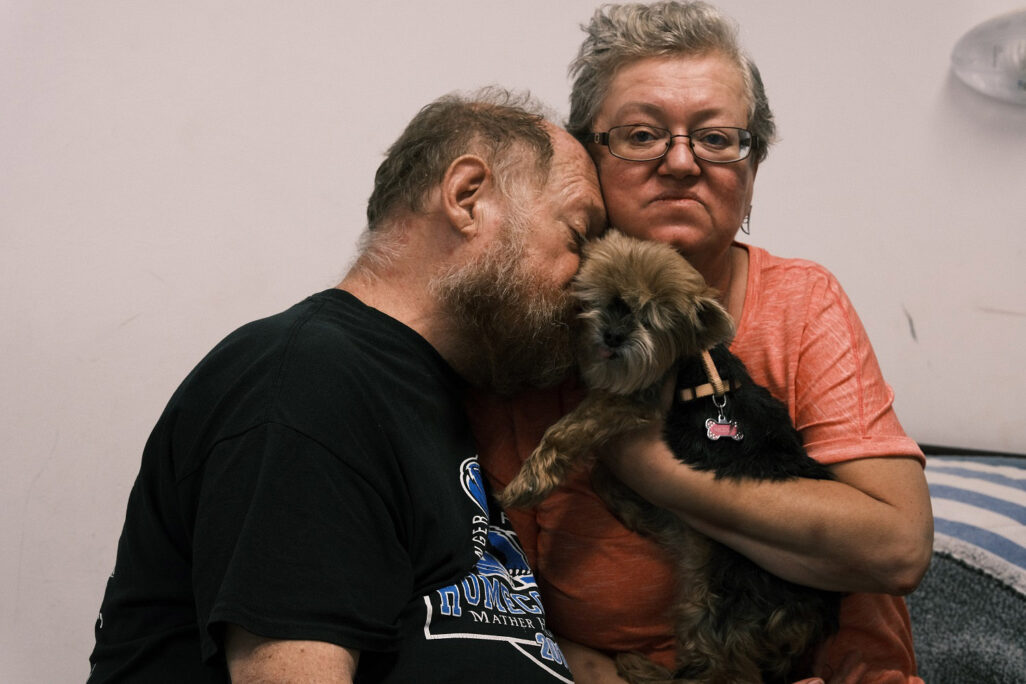
Three families from Metula, Israel’s northernmost town, have relocated to the seminar center at Kibbutz Ravid in the Lower Galilee following escalating tensions with Lebanon. The families are immigrants from the former Soviet Union who have lived in Metula for more than 30 years, sticking it out through various wars and operations. This time, they feel, the situation is different. Following the Oct. 7 disaster, they are left with heavy questions.
“Now everything is good because they host us nicely,” says Yelena Zaretsky, who came to Ravid with her husband Igor and their dog Nicole. “I’m just worried that in two weeks they’ll say that's it, and we’ll have to pay for everything. That’s what’s stressing me the most right now, because we have no way to pay for it. As soon as I got here, I said I was ready to cook, clean and help the kibbutz with whatever was needed.”
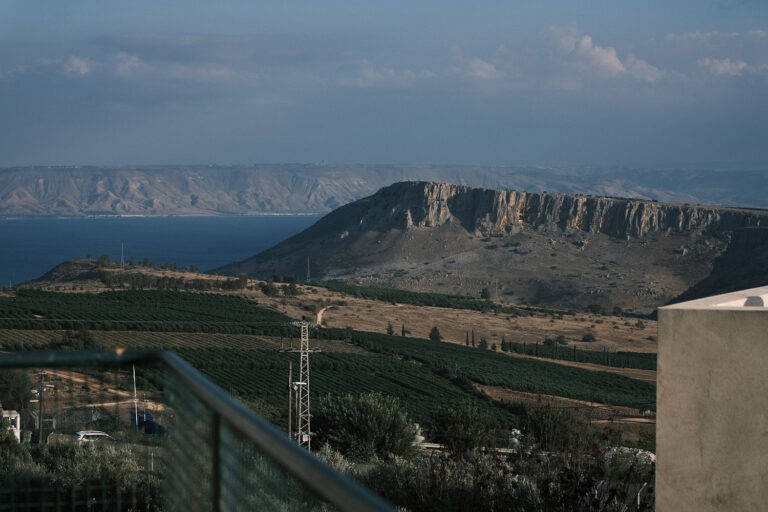
“I’m not worried," says Igor. During the Second Lebanon War, they lived for a month and a half in a settlement in the south of the Golan Heights, and the memory leaves him optimistic. His gut feeling says that this time the events will continue for a long time. “We will manage to deal with everything. A month, two months, however long it takes,” he says.
The couple immigrated to Israel from Belarus straight to Metula. When they left for Ravid, they took most of their wardrobe, medicine, and some drinks with them. Their neighbor Maya Fishenson, a woman in her nineties who immigrated to Israel from Ukraine, came with them. “I didn’t want to go at all,” she says. “Where will they take me? What will happen to me? At my age these are too difficult questions. I am very attached to my home. To my animals. How will I sleep on mattresses in the community center?”
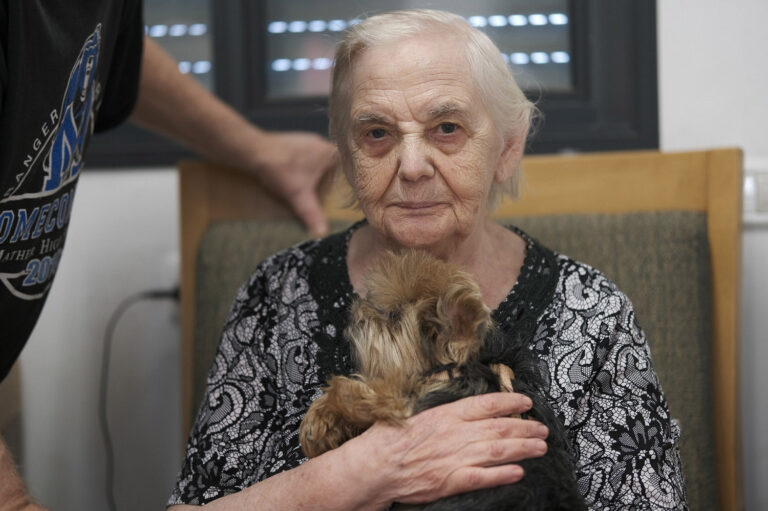
After almost giving up, Yelena and Igor Zaretsky managed to convince Fishenson to come with them at the last minute. They were looking for a place that would allow them to bring their animals, and that's how they came to the kibbutz. “We are here together, like one family,” says Yelena. “We took the whole house, but Maya’s cat had to stay. She’s a bit of a street cat, and you can’t just catch her. We haven’t thought about how she'll eat yet.”
Zaretsky is an experienced figure skating coach who has worked and coached in central Canada. Among her students were her two children, Roman and Alexandra, the most decorated skaters in Israel's history, who participated in two Olympics. Fishenson’s son is also an award-winning skater and coach. Their children are in the United States and are being cared for from afar.
“Until now there is a big mess,” says Zaretsky. “The left hand doesn’t know what the right hand is doing.” She says that leaving Metula took several days and that people there are still evacuating.
“For a week we were locked in a safe room until it was no longer possible,” says Natalie Blagodatny, an attorney from Metula with a private office in Kiryat Shmona, another town close to the border with Lebanon.
Blagodatny is staying on Ravid with her two children, Sofi and David. Her family moved to Kiryat Shmona when she was a child, and she moved to Metula after starting her own family.
“I moved here and stayed during all the wars of the last 30 years,” she says. “I remember how in 1996 we were evacuated to Ashkelon during Operation Grapes of Wrath. During the Second Lebanon War, I was in the Golan for a month and a half.”
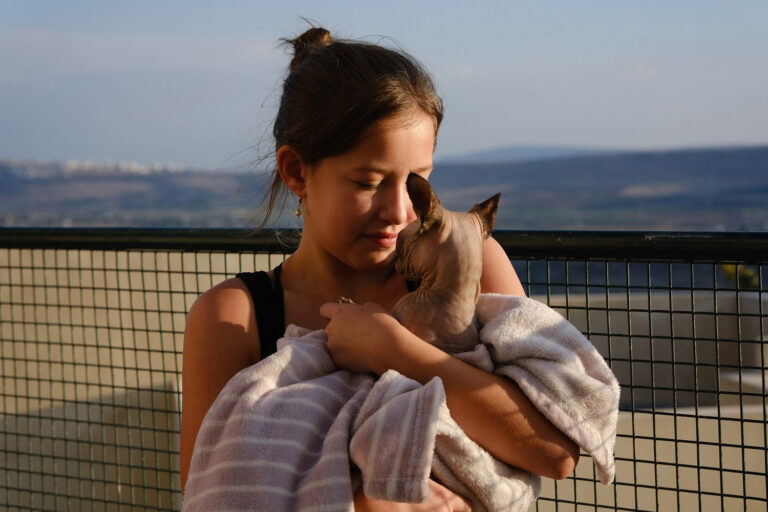
She says that all residents of Metula live with the awareness of being on the front line, ready at any moment for the town to be declared a closed military area. “Those who live there all their lives don’t think about it on a daily basis,” she says. “They get used to it. But the post-trauma that manifests itself with every slamming of a door always remains.”
When Blagodatny left her home, she left her two dogs at the boarding house in Korazim. Her little sphinx cat Nela she took with her. “The cat requires a lot of care—showers, nails,” Blagodatny’s sixth-grade daughter Sofi explains. Sofi is never far from Nela. “I also took some markers and paints with me so that I can draw,” she says.
“The lack of support from the state is very troubling,” says Natalie. “There is no regulated legislation regarding the compensation of employers during wartime. It usually happens by order after the war. But right now I have to pay the workers and maybe later I will be compensated, not in full, and I don't know when. My office is closed, but the current expenses continue.”
“I just don't understand how something like this can happen in our strong country,” says Blagodatny’s neighbor Yelena Spozhnikov. Her grandchildren are in the army, and even though she hasn’t been home for a week, her mind is mainly focused on the difficult scenes that emerged from the Gaza Strip.
“How long has something like this been planned?” she says with concern. “How was it possible to bring so many vehicles freely through the border? Was there treason here? I can’t give it any other explanation. How was it possible to wait 10 hours for soldiers to come?”
She throws her hands in the air in despair. “We in Metula have an entire military force that protects us, our soldiers in front of each of their positions. If we had to wait 10 hours, no one would be left alive.”
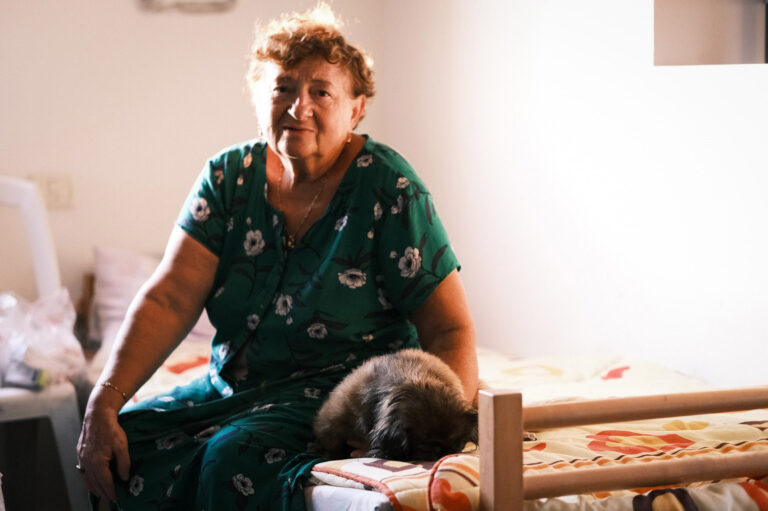
Spozhnikov took the dog Laura with her, but she is heartbroken about the eight cats she had to leave behind. “We won't be able to return to our homes until we have full trust in the security forces who will be able to protect our lives. Strengthening the border, moving the border away. I don’t know. But the trust is broken. We feel alone,” she says.
“I will not leave Matula,” Blagodatny says. “I really love the town. We had 17 years of peace and we will have another 17 years of peace. At least I hope so.”






